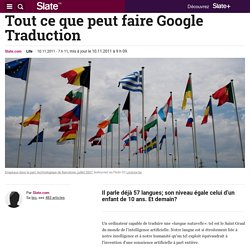

Thinking in a foreign language 'leads to more rational decision making' By Beth Stebner Published: 05:05 GMT, 26 April 2012 | Updated: 05:56 GMT, 26 April 2012 Got a difficult decision to make?

Why not mull it over auf deutsch? A new study suggested that people are prone to make more sound, less risky decisions if they are thinking in a language other than their native tongue. The series of experiments, conducted by Boaz Keysar of the University of Chicago, led the scientists to believe that ‘using a foreign language reduces decision-making bias,’ Dr Keysar’s team wrote. Lost in translation: A new study found that people made more logical decisions in a foreign language Their findings, published in an April 18 Psychological Science study, say that human reasoning is shaped by both systematic, rational ideas, and another that’s emotionally-charged and rapid.
Dr Keysar wrote: ‘A foreign language provides a distancing mechanism that moves people from the immediate intuitive system to a more deliberate mode of thinking.’ Multilingualism. Multilingualism is the act of using polyglotism, or using multiple languages, either by an individual speaker or by a community of speakers.
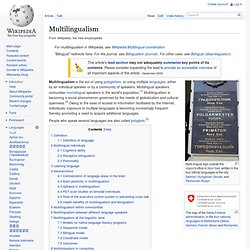
Multilingual speakers outnumber monolingual speakers in the world's population.[1] Multilingualism is becoming a social phenomenon governed by the needs of globalization and cultural openness.[2] Owing to the ease of access to information facilitated by the Internet, individuals' exposure to multiple languages is becoming increasingly frequent thereby promoting a need to acquire additional languages. Definition[edit] Poor language skills put Scots at disadvantage - News. Last Updated:1 April, 2011Section:News Early opt-outs and removal of foreign assistants fuel rapid decline of languages, TESS survey reveals.
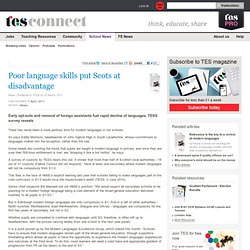
The Benefits of Bilingualism. Callander teenager named 'most multi-lingual' in the UK. 30 March 2012Last updated at 07:55 ET By Huw Williams BBC Scotland reporter Arabic is one of Bruce's seven languages, including English A 14-year-old from Callander has been named the most multi-lingual child in the UK.
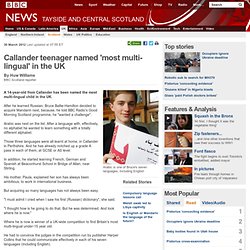
After he learned Russian, Bruce Ballie-Hamilton decided to acquire Mandarin next, because, he told BBC Radio's Good Morning Scotland programme, he "wanted a challenge". Arabic was next on the list. After a language with, effectively, no alphabet he wanted to learn something with a totally different alphabet. Those three languages were all learnt at home, in Callander in Perthshire. In addition, he started learning French, German and Spanish at Beaconhurst School in Bridge of Allan, near Stirling.
His mother, Paula, explained her son has always been ambitious, to work in international business. But acquiring so many languages has not always been easy. "I must admit I cried when I saw his first (Russian) dictionary", she said. "I thought how is he going to do that. “Start Quote. Les accents : les voix de la diversité. Will It Matter If We Speak Different Languages In The Future? The Rosetta Stone, an ancient Egyptian decree written in hieroglyphics, script, and Ancient Greek, made translation of hieroglyphics possible.

The notion of ‘foreign’ languages is beginning to disappear, thanks to ongoing developments by the likes of Google and Facebook that help the thousands of languages across the world be less foreign and more accessible. How? By making language translation easier than ever. In light of the technological progress in translation software made over the last decade, we may very well be on the cusp of witnessing the majority of language barriers between people groups disappear. Not only does that mean everyone will be able to speak their natural tongue, learning another language will be purely out of interest or linguistic study, not a degree requirement for students or mandatory continuing education for international business people.
Not content with software that’s good but not perfect, the company has recently made a slew of improvements to Translate. Négation en français. Un article de Wikipédia, l'encyclopédie libre.
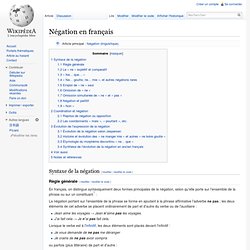
Syntaxe de la négation[modifier | modifier le code] Règle générale[modifier | modifier le code] En français, on distingue syntaxiquement deux formes principales de la négation, selon qu'elle porte sur l'ensemble de la phrase ou sur un constituant[1] : La négation portant sur l'ensemble de la phrase se forme en ajoutant à la phrase affirmative l'adverbe ne pas ; les deux éléments de cet adverbe se placent ordinairement de part et d'autre du verbe ou de l'auxiliaire : Jean aime les voyages → Jean n’aime pas les voyages.J’ai fait cela → Je n’ai pas fait cela.
Consonne fricative uvulaire voisée. Un article de Wikipédia, l'encyclopédie libre.
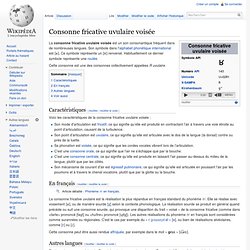
La consonne fricative uvulaire voisée est un son consonantique fréquent dans de nombreuses langues. Son symbole dans l'alphabet phonétique international est [ʁ]. Ce symbole représente un [ʀ] renversé. Habituellement ce dernier symbole représente une roulée. Cette consonne est une des consonnes collectivement appelées R uvulaire. Caractéristiques[modifier | modifier le code] Tout ce que peut faire Google Traduction. Un ordinateur capable de traduire une «langue naturelle»: tel est le Saint Graal du monde de l’intelligence artificielle.
